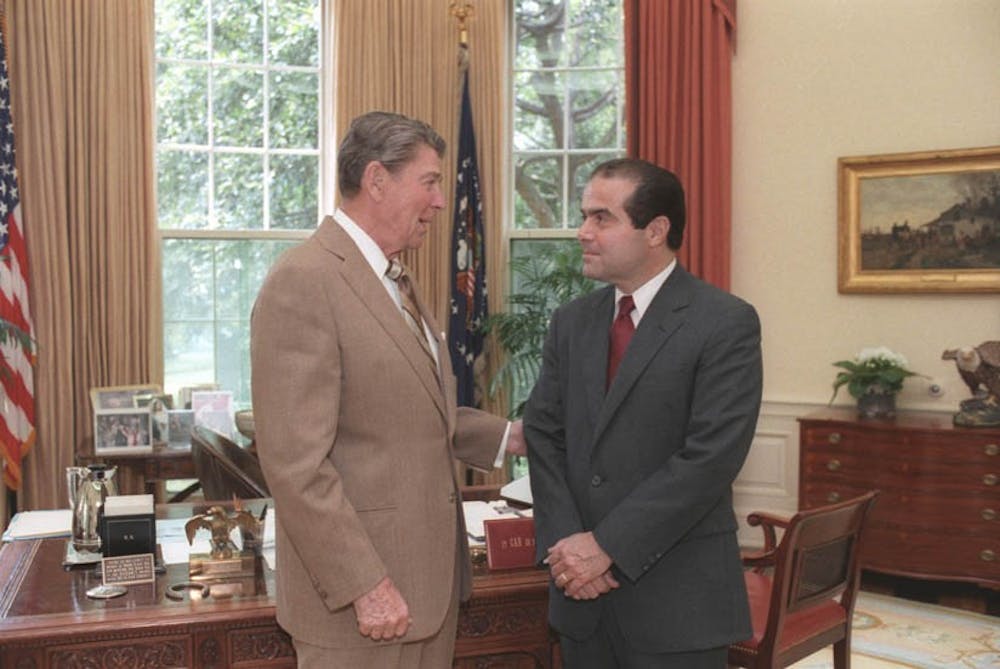The American public gasped and the presidential race took an unexpected twist when Supreme Court Justice Antonin Scalia died Feb. 13. Scalia, who served on the court since 1986, was loved by some and loathed by others in part for his strong originalist beliefs. Kevin Walsh, professor of law, and Jennifer Bowie, professor of political science, answered some questions regarding Scalia's legacy and the political process of appointing a new justice.
The Collegian: How would you describe Justice Scalia's personality and relationships with others?
Kevin Wash: Justice Scalia was quick-witted and gregarious. He liked to cut right to the point in everything and to be provocative, though not simply for the sake of being provocative. By challenging interlocutors’ arguments, for example, he forced them to articulate them more strongly or to abandon them. His friendships with people who held widely differing understandings of the world—such as Justice Ruth Bader Ginsburg—were an example of friendship at its best.
The Collegian: How would you describe Scalia's approach to the constitution and his role on the Supreme Court?
KW: Justice Scalia championed originalism, the view that the meaning of constitutional provisions is fixed at enactment until lawfully changed. He opposed the idea of a “living Constitution” that changes from age to age to abreast with changes in society. Justice Scalia’s role on the Court was to press the lawyers with challenging questions at argument and to hold his judicial colleagues accountable to the law.
The Collegian: What is Scalia's legacy?
KW: Justice Scalia is a hero to those in later generations who are inspired by his relentless focus on the fundamentals of legal meaning in the text of the Constitution and laws. His emphasis on originalism and textualism changed the mix of arguments made to the Supreme Court to give greater prominence and weight to text-based arguments. Justice Scalia could be polarizing. But love him or leave him, he could not be ignored. One of the best writers ever to sit on the Supreme Court, his opinions will continue to instruct generations of law students and citizens.
The Collegian: How pressed for time is President Barack Obama to appoint someone to replace Scalia’s spot on the Supreme Court?
Jennifer Bowie: Time is of the essence for Obama. When Scalia passed Obama had 342 days left in his presidency. Going back to Justice Scalia’s confirmation through the most recent Justice Kagan’s confirmation it takes on average 72.7 days to confirm a Supreme Court justice. On Tuesday, the Republican Senators on the Senate Judiciary Committee signed and sent a letter to Senate majority leader Mitch McConnell indicating that the would not hold hearings on President Obama’s nominee. On the other hand President Obama said he would make his nomination shortly. Given the stance each side has taken the confirmation process could be drawn out much longer than the average number of days. I suspect in the next couple of weeks President Obama will announce the name of his Supreme Court nominee.
The Collegian: How do you expect Scalia’s passing to impact the presidential and senate races?
JB: Most of the time Supreme Court vacancies do not occur during a presidential election year. Furthermore, political science research has shown that justices typically try to time their departure from the Court under a President that is like minded. The idea is that justices will consider the likely disposition of their successor in their decision to retire or remain on the Court. I think it is fair to say that Scalia would not plan to retire from the Court under Obama or any Democrat president. Additionally, with the passing of Scalia the Court is ideologically divided so Scalia’s replacement will have a major impact on the ideologically leanings of the Court. We have already seen through the presidential debates since Scalia’s death that this vacancy and who fills it is of upmost concern for the presidential candidates.
Contact editor-in-chief Jack Nicholson at jack.nicholson@richmond.edu
Enjoy what you're reading?
Signup for our newsletter
Support independent student media
You can make a tax-deductible donation by clicking the button below, which takes you to our secure PayPal account. The page is set up to receive contributions in whatever amount you designate. We look forward to using the money we raise to further our mission of providing honest and accurate information to students, faculty, staff, alumni and others in the general public.
Donate Now



